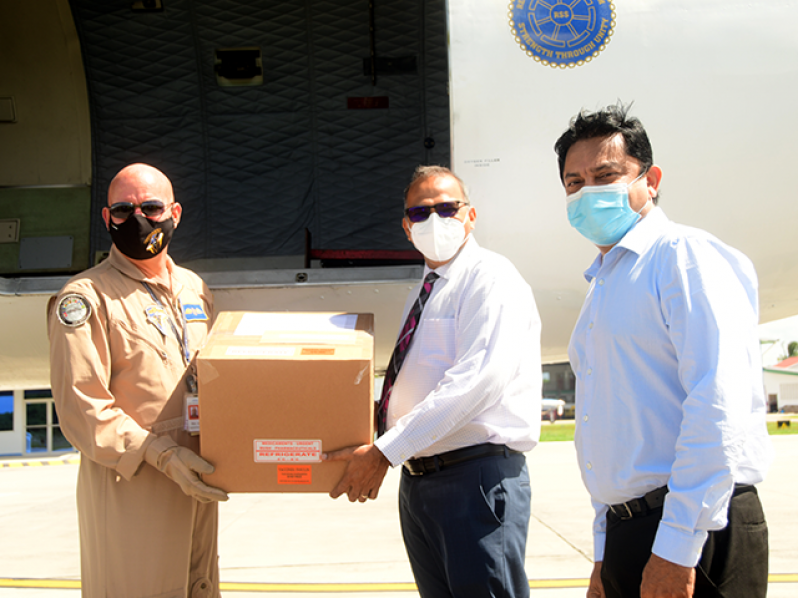— first set of health workers to be vaccinated today
— following Barbados’ donation of 3,000 Oxford-Astrazeneca vaccines to Guyana
GUYANA’s first set of health workers will receive their COVID-19 vaccines today, following the arrival of a donation of 3,000 Oxford-Astrazeneca vaccine doses from Barbados on Wednesday.
On Tuesday, Barbados received 100,000 doses of the Oxford-AstraZeneca COVID-19 vaccine, which is manufactured by the Serum Institute in India, and is called ‘Covishield’ in that country. Just after receiving that first set of COVID-19 vaccines from India, Barbados sent 3,000 vaccines to Guyana which will allow 1,500 persons to benefit, since these vaccines are given in two doses.
The vaccines arrived at the Ogle airport on Wednesday and they were received by Minister of Health, Dr Frank Anthony and Chief Medical Officer, Dr Narine Singh. Subsequently, 100 members of the Caribbean Community (CARICOM) Secretariat will be vaccinated from this set, while the remaining 2,800 doses will be given to 1,400 local frontline workers.
“(On Thursday), we will have an exercise… We’ll get persons from the Georgetown Public Hospital Corporation (GPHC) and those in charge at the Ocean View Facility (the National Infectious Diseases Hospital). We’ll start with those persons because they are really the ones who interact more often with the patients,” Dr Anthony said while at the Ogle Airport.
Dr Anthony emphasised that the vaccines will be distributed to those health workers who are at a higher risk of being exposed to the COVID-19 virus, but noted that health workers do have the option of refusing the vaccines if they do not want to take it.
“I wish to thank Prime Minister Mia Mottley and, by extension, the people of Barbados for sharing with us from their first batch of vaccines. This act of kindness is among many in recent months that Guyana and Barbados have shared,” President Dr Irfaan Ali said in a statement.
The President reminded that in the coming days and weeks, Guyana will be receiving its own sets of vaccines that the government has been able to secure through various engagements with the global vaccines alliance known as the COVAX facility, countries developing vaccines, vaccine manufacturers and other groups.
TOP PRIORITY
“I assure Guyanese that this issue is the top priority on our agenda and our aim is to ensure that every Guyanese is vaccinated before the end of the year,” President Ali emphasised further.
Barbados and Dominica were the first countries in the region to receive vaccines from India as part of India’s vaccine diplomacy efforts. And Prime Minister of Barbados, Mia Mottley, said this is the first batch of a potential 200,000 doses of the vaccine from India, as negotiations are still ongoing.
According to Dr Anthony, as of today, this Oxford-Astrazeneca vaccine will receive emergency use authorisation from the World Health Organization (WHO). This authorisation paves the way for Guyana to begin distributing it to its citizens.
The Oxford-Astrazeneca vaccine, reportedly, has an efficacy of 62 per cent. However, it is also reportedly 90 per cent efficacious with a lower dose than the required two doses. Importantly, the Oxford-Astrazeneca vaccines do not require cold or ultra-cold storage like the Pfizer and Moderna vaccines. They can be stored in a normal refrigerator, between two to eight degrees, which make them easier to distribute and more suitable for global south countries such as Guyana.
The storage of vaccines in higher temperatures, as opposed to the cold or ultra-cold storage, makes it easier to transport the vaccine doses to rural and hinterland regions. This would be particularly necessary in Guyana.
Altogether, thus far, Guyana has been able to secure 273,000 vaccine doses which could be used to immunise some 136,500 individuals, or approximately 18 per cent of the population. The government is in talks with India, Russia and China, in addition to a number of multilateral agencies and manufacturers of the vaccines, to secure more for the population, since vaccines are the means of exiting the pandemic.
The Health Minister has continuously emphasised that the vaccines will be used to immunise frontline workers, the elderly and persons with co-morbidities (other underlying medical conditions) first. There are about 22,000 healthcare workers who are all eligible to receive the vaccines, while the remainder will go to the other two groups.
Dr Anthony has also emphasised that widespread vaccination is the avenue through which Guyana, and all countries, would be able to exit the pandemic.











